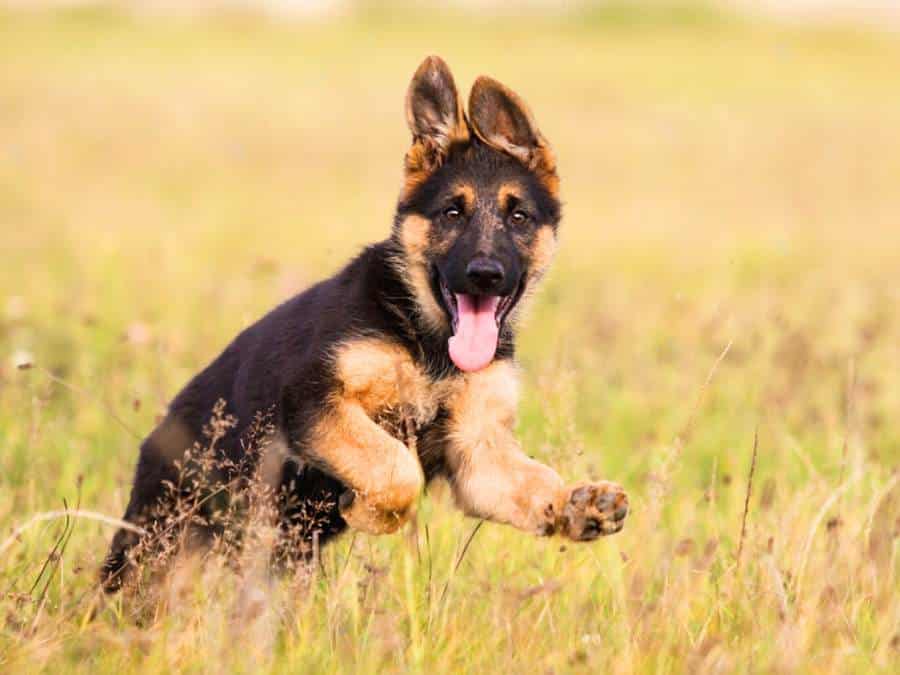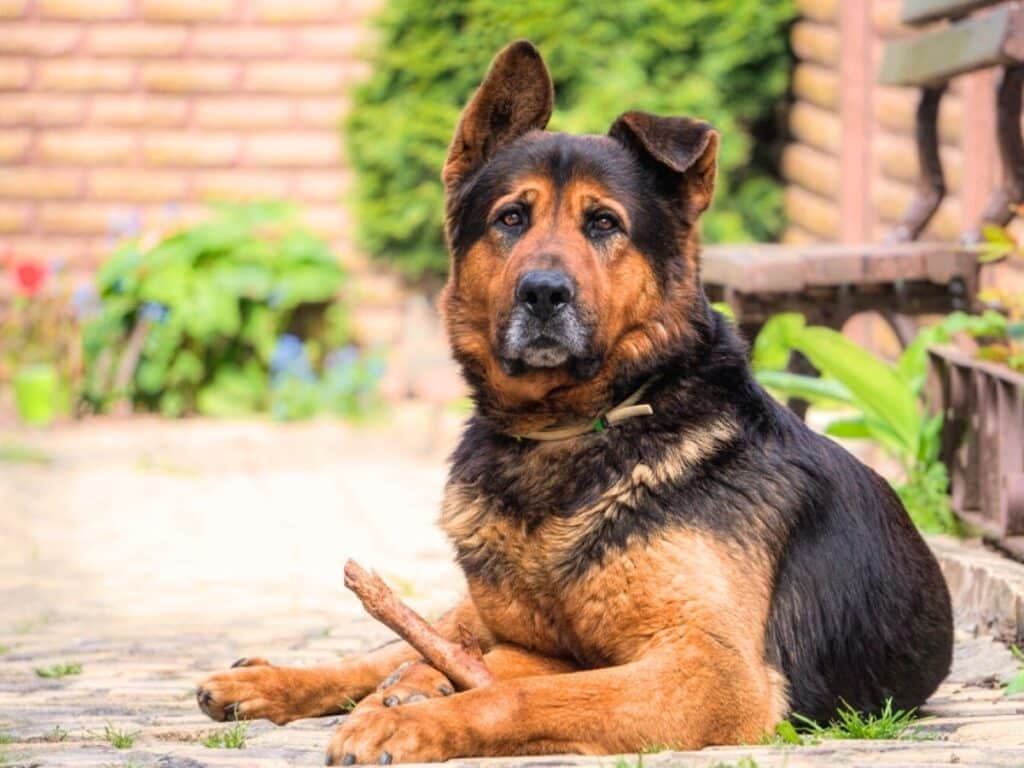So, you’ve got yourself a lively little German Shepherd puppy and you’re probably wondering when this bundle of energy will finally settle down.
Well, patience is key. It’s essential to remember that every dog is unique and will progress at their own pace. While some German Shepherds may start showing signs of maturity around 2-3 years old, others may take longer.
In the following sections, we’ll delve deeper into this topic, providing insights and tips on how to navigate through your dog’s hyperactive phase successfully.
When Will My German Shepherd Puppy Calm Down?
A German Shepherd puppy typically starts to calm down as it reaches adulthood, which is around 2 to 3 years of age. During puppyhood (up to 6 months), they’ll be very energetic and require basic training and socialization. In adolescence (6 months to 1.5 years), they’ll still have bursts of energy but will gradually become more manageable. Young adulthood (1.5 to 3 years) is when you’ll see significant improvements in their behavior.
Age Milestones for a German Shepherd Puppy’s Calmness
The behavior energy levels of a German Shepherd puppy can vary from one dog to another, but there are some general trends you can expect as your puppy grows and matures.
Here’s a rough timeline of what you can expect:
1. Puppyhood (up to 4 months)
During the first few weeks of their life, puppies haven’t yet developed the ability to control their impulses or understand boundaries. So, don’t be surprised if your pup zooms around the house like a rocket or chews on everything in sight. This is completely normal behavior for a young pup.
2. 4-6 Months
This is when they start teething, and those sharp little teeth can cause them discomfort. To alleviate this discomfort, they may chew on anything they can sink their teeth into – including your favorite pair of shoes! But fear not, my friend, this phase shall pass.
3. Adolescence (6-18 months)

Around 6-18 months old, your German Shepherd puppy enters their teenage phase. Just like human teenagers pushing boundaries and testing limits, your pup might become more independent and stubborn during this time. They might even challenge your authority from time to time. Remember patience is key during this stage!
4. Adulthood (18 months onwards)
Finally, after all the wild adventures and youthful exuberance comes a time when your German Shepherd starts to mellow out a bit – usually around 2-3 years old. By this age, most German Shepherds have reached their adult size and mental maturity.
They have learned the rules of the house and have a better understanding of what is expected of them. While they may still have bursts of energy, they are generally more calm and composed.
It’s important to note that consistent training, socialization, and exercise are key factors in helping your German Shepherd puppy develop into a well-behaved adult dog. Be patient and provide the necessary guidance and structure to help your puppy become a well-adjusted adult companion.
Unlock the secret to a peaceful, well-behaved furry friend! Join our Brain Training For Dogs Course today and transform your hyperactive pup into a calm and balanced companion.
RELATED:
Why is My German Shepherd So Hyperactive?

Apart from their inherent high-energy nature, certain behavioral issues can contribute to hyperactivity in German Shepherds. Understanding these issues can help address the root causes of hyperactive behavior:
- Age: Puppies are naturally more energetic than adult dogs. If your German Shepherd is still a puppy, it’s normal for them to have high energy levels. They will likely calm down as they mature.
- Lack of Exercise: German Shepherds are a working breed and need regular exercise to expend their energy. If they aren’t getting enough physical activity and mental stimulation, they may become hyperactive out of boredom.
- Lack of Mental Stimulation: These dogs are also highly intelligent, and without mental stimulation, they can become restless and hyperactive. Engaging in activities like obedience training, puzzle toys, and interactive play can help keep their minds busy.
- Health Issues: Sometimes, hyperactivity can be a sign of underlying health problems. If you suspect your German Shepherd is excessively hyperactive, it’s a good idea to consult with a veterinarian to rule out any medical issues.
- Stress or Anxiety: Anxiety or stress can also cause hyperactivity in dogs. Changes in their environment, routine, or exposure to certain stressors can lead to increased activity levels. Addressing the underlying anxiety with training or behavioral modification may be necessary.
- Genetic predisposition: GSDs were originally bred as working dogs, so they have this innate drive to be active and alert. They were used for herding livestock and protecting their human pals. Over time, these qualities became deeply embedded in their DNA, making them high-energy bundles of fur.
Addressing these behavioral issues requires patience, consistency, and positive reinforcement training techniques. Seeking guidance from a professional dog trainer or behaviorist can be beneficial in developing strategies tailored to your German Shepherd’s specific needs.
RELATED:
- 7 Ways to Tire Out a German Shepherd (No Walking/Running)
- German Shepherd Sleeping With Owner: Is It Safe For You?
- Why Is My German Shepherd So Hyper?
How To Help Your German Shepherd Puppy To Calm Down

If you find yourself struggling to calm down your German Shepherd puppy, here are 10 effective techniques you can try:
1. Create a calm environment
Provide a designated space for your puppy that is quiet and free from distractions. This can be a crate or a specific room where they can relax and unwind.
2. Establish a routine
Dogs thrive on routine, so establish a consistent daily schedule for feeding, exercise, and playtime. This will help your puppy feel more secure and reduce their overall anxiety.
RELATED: How Much Exercise Does a German Shepherd Need Per Day?
3. Mental stimulation
Keep your German Shepherd puppy mentally stimulated with puzzle toys, obedience training, and interactive games. This will help tire them out and redirect their energy in a positive way.
4. Physical exercise
German Shepherds are an active breed that requires plenty of exercise. Regular walks, play sessions, and opportunities for off-leash running can help burn off excess energy and promote relaxation.
RELATED: How To Stop a German Shepherd From Herding

5. Positive reinforcement
Use positive reinforcement techniques, such as treats and praise, to reward calm and relaxed behavior. This will encourage your puppy to associate calmness with positive experiences.
6. Massage and gentle touch
German Shepherds respond well to gentle touch and massage. Take the time to give your puppy a soothing massage, focusing on their neck, shoulders, and back. This can help relax their muscles and promote a sense of calm.
7. Provide a safe space
Introduce a designated cool-down area using puppy pens or crates where your German Shepherd can retreat when they’re feeling overwhelmed or overstimulated. This space should be cozy, quiet, and free from distractions. Provide comfortable bedding along with some toys or chew treats to keep them entertained during their relaxation time.
RELATED: How to Crate Train a German Shepherd Puppy?
8. Increase socialization activities
Expose your puppy to different environments, people, animals, and situations gradually. Arrange playdates with other friendly dogs or enroll them in obedience classes where they can interact with fellow canine companions under controlled circumstances. The more positive experiences they have with others, the more confident and relaxed they’ll become.
9. Don’t leave your pup home alone for too long
German Shepherds are highly social animals that thrive on human companionship. Leaving them alone for extended periods can lead to separation anxiety, which often manifests as destructive behavior or excessive barking. (Source)
RELATED: How To Help Your German Shepherd Overcome Separation Anxiety
10. Avoid overstimulation
Be mindful of overstimulating your German Shepherd puppy. Limit exposure to loud noises, crowded places, and excessive playtime, as these can contribute to heightened excitement and difficulty in calming down.
Remember, patience, consistency, and positive reinforcement are key to helping your puppy develop good calming habits. With time and practice, you’ll be able to enjoy a calmer and more relaxed German Shepherd companion.
RELATED: Are German Shepherds Good With Cats?
Does neutering help calm down a German Shepherd?

Neutering, the surgical removal of a male dog’s testicles (or spaying in the case of females), can have an impact on a dog’s behavior, including their energy levels and temperament. However, the extent to which neutering affects a German Shepherd’s behavior can vary from one dog to another. Here are some points to consider:
1. Reducing hormonal influence
Neutering can reduce the levels of testosterone in male dogs, which may help reduce some aggressive or territorial behaviors driven by hormones. It can also decrease the likelihood of certain health issues, such as testicular cancer.
2. Potential calming effect
According to WebMD for pets, neutering can lead to a reduction in certain undesirable behaviors, such as roaming, marking territory with urine, and aggressive tendencies in some cases. This may result in a calmer overall demeanor.
3. Not a guaranteed solution
Neutering is not a guaranteed method to calm down a hyperactive German Shepherd. While it may help with specific behaviors influenced by hormones, it may not address all aspects of hyperactivity or excitability. Other factors, such as genetics, socialization, and training, also play a significant role in a dog’s behavior.
4. Timing matters
The timing of neutering can influence its effects. Neutering a dog at a young age (before sexual maturity) may have a more pronounced impact on behavior, while neutering an adult dog may have less of an effect.
5. Behavior modification
Neutering should not be seen as a standalone solution for managing hyperactivity in German Shepherds. It should be combined with consistent training, exercise, and mental stimulation to address the root causes of hyperactivity.
6. Results may vary
Keep in mind that each dog is unique, and the impact of neutering on behavior can vary widely. Some dogs may become calmer after neutering, while others may not show a significant change in behavior.
In summary, while neutering can have some influence on a German Shepherd’s behavior, it should be considered as part of a comprehensive approach to managing hyperactivity.
Conclusion
So, when will your German Shepherd calm down? Well, it’s important to remember that every dog is different and there isn’t a specific age or time frame for when they will calm down. However, with proper training, exercise, and patience, you can help your German Shepherd become a calmer and more well-behaved companion.
To start, make sure you’re providing enough physical and mental stimulation for your furry friend. Remember to be consistent with your training efforts and provide positive reinforcement when they exhibit calm behavior. It may take some time and effort, but with love and dedication, your German Shepherd can learn to relax and enjoy a peaceful life by your side.
Frequently Asked Questions (FAQs)
1. How long does it take for a German Shepherd to calm down?
It varies from dog to dog. Some German Shepherds may start calming down around 2-3 years old while others may take longer until they reach 4-5 years old.
2. Can neutering help calm down my hyperactive German Shepherd?
Neutering can sometimes have a calming effect on male dogs by reducing testosterone levels. However, it may not guarantee a complete change in behavior as other factors like training and exercise also play a significant role.
3. Is it possible for an older German Shepherd to become calmer?
Yes! Even if your older German Shepherd has been hyperactive for years, it’s never too late to work on their behavior. Consistent training methods combined with mental and physical exercise can help them become calmer over time.
4. How much exercise does a German Shepherd need to calm down?
German Shepherds are an active breed and require at least 1-2 hours of exercise daily. Engaging in activities like long walks, runs, playtime, and mental stimulation exercises can help burn off their excess energy and promote calmness.
5. Can certain foods or supplements help calm down a hyperactive German Shepherd?
While specific foods or supplements may not directly calm down your German Shepherd, ensuring they have a balanced diet with high-quality ingredients can contribute to their overall well-being and potentially improve behavior.




